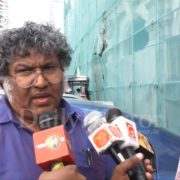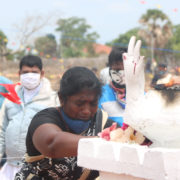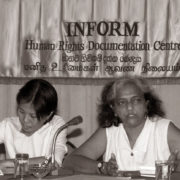DOWNLOAD FULL REPORT: ENGLISH | SINHALA | TAMIL |
After the completion of 365 days of continued protests by Tamil families of disappeared in the North and East and commencement of consultation meetings by the Office of the Missing Persons, disappearances continued to be a controversial human rights issue. During the period, protesting families faced obstacles from police in the East and an event at the UN building in Geneva where some Tamil families of disappeared were speaking, were disrupted. The wife of a disappeared journalist was at receiving end of death threats and hate speech attacks, when a Buddhist Monk was convicted for having threatened her in court premises in 2016. A lawyer appearing for families of disappeared in a court case where navy officers have been arrested, also reported about threatening phone calls.
Journalists also continued to face attacks, threats and harassments. In the North, four Tamil journalists were subjected to physical attacks, threats, interrogation and intimidation. Another Northern journalist reported being threatened by staff of a private company for coverage of a protest. A Colombo based journalist was summoned for questioning by Police for retweeting a tweet and the summons was withdrawn after it received wide publicity. Another Colombo based journalist reported harassment and threats outside court premises. President Sirisena publicly warned about a social media ban.
In an incident that went viral, a Railway department staff was caught on video engaging in racial abuse against Tamils while on duty. He had been accused of sexually harassing a Tamil woman and threatening a Tamil journalist / activist who had tried to intervene. Both victims were made to wait around 5 hours before Police took down their complaints.
Intimidation of protesters by taking photos continued during the period, by Police as well as security staff of the Indian Consulate in Jaffna, when a protest against killing of civilians in Thoothukodi, Tamilnadu, India was held outside the Consulate. The construction of a memorial for Tamils killed in the war was stopped, while a political / trade union activist was summoned for questioning in relation to remembrance events for war dead.
An Indian investor who had complained about senior Presidential staff and Chairman of a state corporation taking bribes, had complained to the Police about receiving death threats.
Overall, what was seen was regular repression of dissent, in different parts of the country, by police, government officials and private persons against journalists and activists reporting and campaigning on a range of issues such as disappearances, corruption, livelihood, and sexual harassment.





Comments